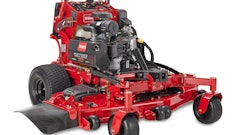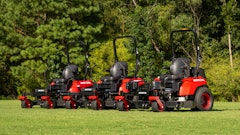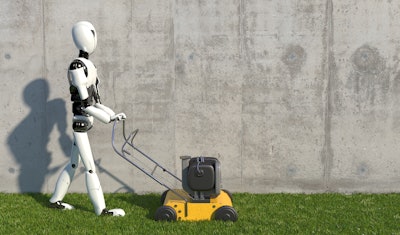
While issues like high gasoline prices and lower margins on work are often concerns for most commercial landscaping professionals, it’s labor shortages and retention that consistently top the list.
Not only is it difficult to find enough employees to fill work orders, it’s also hard to retain the employees landscaping contractors already have on staff. Many have turned to the country’s H-2B guest worker program for help filling open roles, but even that may become less reliable as the country makes changes to its immigration laws.
With the invention and use of autonomous and remote-operated mowers, commercial lawncare professionals can help augment — not replace — their existing workforce.
It’s important for companies that work with commercial landscapers to keep their challenges in mind and start reshaping the labor narrative through technology. With the invention and use of autonomous and remote-operated mowers, commercial lawncare professionals can help augment — not replace — their existing workforce while making these careers more appealing, rewarding and scalable.
Lawncare’s newest technologies should work to strengthen commercial landscaping businesses by allowing companies to scale without overextending their workforce. Technology and manufacturing companies should work to provide products that help landscapers increase their profitability while providing long-term job security for employees.
Technology also attracts a new kind of worker:
- One who is interested in learning how technology can help them map mowing routes,
- Utilize existing labor for smoother operations and,
- For small and mid-sized businesses, help win and retain more contracts.
 RC Mowers
RC Mowers
Building a Pathway to Higher-Skilled Roles
While we have dreamt of autonomous automobiles for decades, most are still in the production and testing phase with few on the road. However, autonomous and remote-controlled lawnmowers are already mowing perfectly striped swathes of land and tackling the most challenging terrains across the country.
For the landscaping companies that already have them in use, they have been used in augmenting labor shortages and have made lawncare a more serious and even cerebral career. Workers are transitioning from purely physical roles to tech-assisted ones, gaining transferable skills in automation, diagnostics and field operations.
These include robotic mower operators, field techs, and fleet coordinators — roles that are ultimately more attractive to younger generations.
Attracting Gen Z and Beyond
For many in the youngest generations, the thought of paying hundreds of thousands of dollars in student loans while trying to survive on entry-level salaries is not appealing. Many are already considering pivoting to skilled trades as career options. Not only are trade schools less expensive than four-year colleges, they also graduate most of their students in less than two years, and entry-level salaries are higher than many jobs that require a college degree.
This is a trend landscapers who employ the use of robotic mowers can certainly latch onto. To generations used to spending hours building problem-solving and soft skills by gaming online, operating cutting-edge technology is exciting, modern and appealing.
The landscaping industry can now compete with other skilled trades by offering roles that combine outdoor work with tech-driven tools.
 RC Mowers
RC Mowers
Making Outdoor Work Safer and More Enjoyable
Robotic mowers are also making it safer for workers to take up landscaping careers. Remote-operated robotic mowers that can cut brush on the most rugged terrain with steep slopes are already on the market.
Workers spend less time in extreme heat surrounded by biting insects or on vibrating equipment to get tough jobs done. Users report that their robotic mower is so efficient, they can take five to seven workers off slope detail and let the mower handle the more dangerous jobs. These employees can then be repurposed to other jobs.
Reducing injury and allowing workers to demonstrate their creative or technical abilities also keeps them happier.
Keeping Workers on the Job
In general, automation enhances job satisfaction by freeing employees to focus on higher-value work. The same is true in the commercial landscaping industry.
Instead of risking injury…employees can focus on the skilled tasks that require attention to detail and customer care.
Employees also feel that employers who use robots to tackle more dangerous jobs care about their well-being. They want to work for a company that invests in their safety and provides them with advancement by using modern technology to augment the toughest and most repetitive aspects of their jobs.
Adding technology also translates into a stronger team culture. Employees not only enjoy working with modern tech, they also aren’t embarrassed to be seen doing it. Technology enhances the employee experience, which leads to increased loyalty and reduced turnover.
Enabling Growth Instead of Taking Jobs
Anyone who has worked in or around the landscaping industry for the past decade already knows that the labor shortage has existed for quite some time. In the case of robotic mowers, necessity has been the mother of invention.
For the workers still on the job, robotic mowers won’t be displacing them. These mowers simply allow landscaping companies to take their existing talent and reallocate them to more detailed and rewarding work. Instead of risking injury string trimming steep terrain or losing valuable time simply mowing large swaths of land, employees can focus on the skilled tasks that require attention to detail and customer care.
In an industry that has “help wanted” signs everywhere, automation is filling the labor gaps and unlocking the growth opportunities that have held landscaping companies back.
Not only are robotic mowers garnering the attention of a new generation of employees, they also help landscaping companies scale their business with the workforce they have while securing larger contracts or even creating niche markets like mowing firelines or focusing on tough terrain.
Because robotic mowers don’t call in sick, don’t take calls at the jobsite, and don’t lose their focus, they are highly efficient and improve the lives of the humans who work around them.
And they are the present and future of the commercial mowing industry.

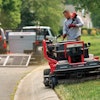
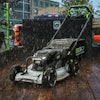
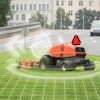
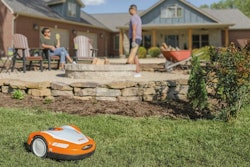







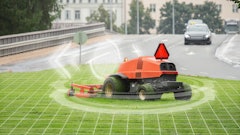
![Gravely Pro Turn Mach One My23 Dsc03139 Edit 1200x800 5b2df79[1]](https://img.greenindustrypros.com/mindful/acbm/workspaces/default/uploads/2025/10/gravely-pro-turn-mach-one-my23-dsc03139-edit-1200x800-5b2df791.BucBnDoN22.jpg?ar=16%3A9&auto=format%2Ccompress&fit=crop&h=135&q=70&w=240)


